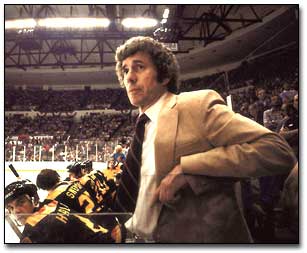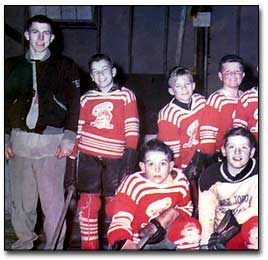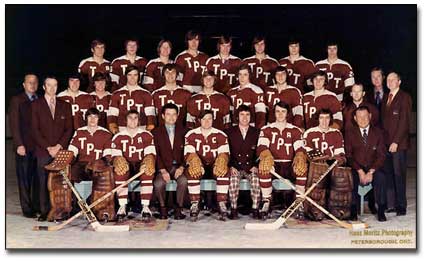 |
Roger Neilson during his days
behind the Vancouver bench
|
Roger Neilson was born on June 16, 1934 in Toronto, Ontario, Canada. Unknowingly, it was then that the path was established to launch Neilson into his journey to become a lifelong coach. An innovative and colourful bench boss, Neilson was noted for his sometimes unconventional coaching methods as he continually tested the boundaries defined by the sport's rules and regulations with his ability to find loop holes in a rule book for the benefit of his team. Above all else Roger Neilson competed hard as a coach in pursuit of a common goal: to achieve team success.
His success at the junior and pro ranks is well documented. Like most volunteer coaches Roger Neilson began with opportunities in minor hockey. He began coaching kids as a 17 year-old student while attending Hamilton, Ontario's, McMaster University. That season, 1951-52, he guided a collection of children sponsored and known as "Dave's White Rose." He won his first title in 1952-53 as his Ideal Welding club captured the Bantam "B" championship. He followed up with a Toronto Hockey League title with Toronto's Shopsy's Pee Wees in 1953-54. He continued with Shopsy's while adding to his coaching reign the Lake Shore Motors Juvenile team in 1954-55. In 1955-56, Neilson coached Westlake Motors Juveniles to a THL championship while also running the bench for Leaside's bantam and midget aged clubs. He coached two minor bantam clubs in 1956-57, the North Toronto Grads, who went on to win an intermediate title, and the Leaside Rangers. He coached the latter club for a second season in 1958-59. He spent the next two season's guiding the Bick's Pickles sponsored Pee Wee team. In 1961-62, he agreed to take the reigns of the Ontario Hockey Association's Junior "B" Aurora Bears. A championship season followed in 1962-63 as the Bick's Pickles midgets won the THL and Ontario provincial title. In 1963-64, he moved again to coach the Toronto North Lions major midget team. In 1965-66 and 1966-67 he looked after the Weston Dodgers midgets. At this same time, Neilson was actively involved with coaching minor baseball in the Toronto area. In ten seasons, Neilson won nine Metro Toronto championships.
 |
Coach Neilson (far left) with his
1954-55 Shopsy's Pee Wees
|
The next chapter in his coaching career involved making the jump to the OHA junior "A" loop. He would spend the next decade coaching the Peterborough Petes. Neilson's teams would finish in the top three of the league standings eight times and the Petes reached the 1972 Memorial Cup final after capturing the OHA Junior A crown. His peers tagged him "Rule Book Roger" during this time as Neilson created a need for rule book changes by taking advantage of weaknesses in the existing rules. He was also adamant about his players obtaining an education. As a high school physical education teacher, Neilson had his players doing aerobic training on the ice long before it was an accepted North American practice. He also introduced breaking down videotape, a noted coaching aid that later earned him the nickname "Captain Video." In fact, as a new coach in the NHL, Neilson would spend hours digesting the recently played game on videotape, often spending all night until dawn to do so.
Prior to his leap to the NHL, Neilson accepted a head coaching assignment with the Dallas Blackhawks. Dallas was a shared minor pro team by Chicago and Toronto, playing in the original Central Hockey League. The Blackhawks finished third in the regular season, losing in the Adams Cup finals by taking the regular season champion Fort Worth Texans to overtime in the seventh and deciding game. This season was Neilson's first and only stop in minor professional hockey.
 |
Coach Neilson (front row in plaid pants) with his Peterborough Petes
|
Roger Neilson began his NHL career with the Toronto Maple Leafs in 1977-78 and his club earned points in 51 of an 80 game regular season schedule. In the post season the Leafs upset the highly favoured New York Islanders in the quarter-finals. After a second season with Toronto, Neilson decided to head down Ontario's QEW highway to become an assistant coach with Scotty Bowman in Buffalo. He was elevated to head coach in 1980-81 where he inspired the Sabres to earn points in 60 of 80 regular season games. The following season, he moved west to serve as an assistant with Harry Neale in Vancouver. He assumed the head coaching duties with five games left in the season as well as the post season. The Canucks caught fire in the "second season" of 1981-82 and gave a highly talented New York Islander team a tough run before bowing out. It was in that playoff year that Neilson created the "white towel affair" in defiance of a perceived bias against his Canucks by NHL on-ice officials. That old-time story has since become hockey lore.
He was contracted as a video analyst with Edmonton during the 1984 playoffs. His assistance proved to be an ingredient of success as the Oilers won their first Stanley Cup championship.
He served as an assistant to Orval Tessier in Chicago for 1984-85 and for two more seasons under Bob Pulford in 1985-86 and 1986-87. He assumed the duties as a Pro Scout with Chicago for two seasons before being lured away by the New York Rangers with another head coaching position beginning in 1989-90. Neilson ran the bench for three and a half seasons. The Rangers won the Patrick Division title in his first year and in 1991-92 the team finished first overall winning the Presidents' Trophy. That season he was runner-up in Jack Adams Award voting as the NHL's Coach-of-the-Year. Midway through the 1992-93 season his tenure with the Rangers ended only to be rejuvenated months later with the expansion Florida Panthers. While playing a highly defensive system, the Panthers set regular season records as a first-year club with 33 wins and 83 points. After a second and final season in Florida, Neilson was hired by St. Louis head coach and former Peterborough alumni Mike Keenan as an assistant in 1995-96. While staying in the "Blue Note" city, Neilson worked with rookie head coach Joel Quenneville for the 1996-97 and 1997-98 campaigns. On March 9, 1998, he took over the head coaching responsibilities of the Philadelphia Flyers. Neilson continued with the Flyers until the conclusion of the 1999-2000 season. Since the fall of 2000 Neilson has assisted Jacques Martin in Ottawa. Martin stepped aside for the final two games of the 2001-02 season to allow Neilson to reach his 1000th regular season NHL game as a head coach. His career record after that milestone game includes 460 wins and 159 ties. In the parts of the 16 NHL seasons that Neilson served as a head coach, Neilson sported a winning record 11 times.
Roger Neilson proved at an early age that he could establish a quality team regardless of the individual talent held by the players. The real talent laid within Neilson who was a superb teacher and who was able to get the most out of his players. During a lifelong commitment to hockey, Roger Neilson has developed these four main coaching principles:
- Establish a good relationship with the team.
- Be prepared and organized.
- Defend and defend well.
- Make them believe both in you and themselves.
His lifelong commitment to hockey does not end when the traditional season winds up. Instead Neilson begins his second season, his vacation, as an operator and instructor of hockey camps. He has operated "Roger Neilson's Hockey Camp," an off-season clinic at the University of Windsor since 1987. Beginning with 1976, he has run a five-week international camp and in 1997 his coaching services took him to Metulla, Israel.
His career continues to move forward despite his recent battles with Cancer. Roger Neilson overcame bone marrow Cancer in 2000 and in January 2001 he was diagnosed with a serious form of skin Cancer, malignant melanoma. A courageous fighter, Neilson has established the Roger Neilson Forever Hockey Fund to help bring children and hockey and fun together.
"An Evening With Roger", a special night honouring a man whose life has touched and influenced so many, was held on June 19, 2002 in his hometown of Toronto. Fittingly he received a call that afternoon from Hockey Hall of Fame Selection Committee Chairman Jim Gregory. Roger Neilson had received the information that he would be inducted into the Builders' Category of the Hockey Hall of Fame on November 4, 2002. For a man who dedicated his life to the advancement of hockey, he will be forever enshrined as such. |